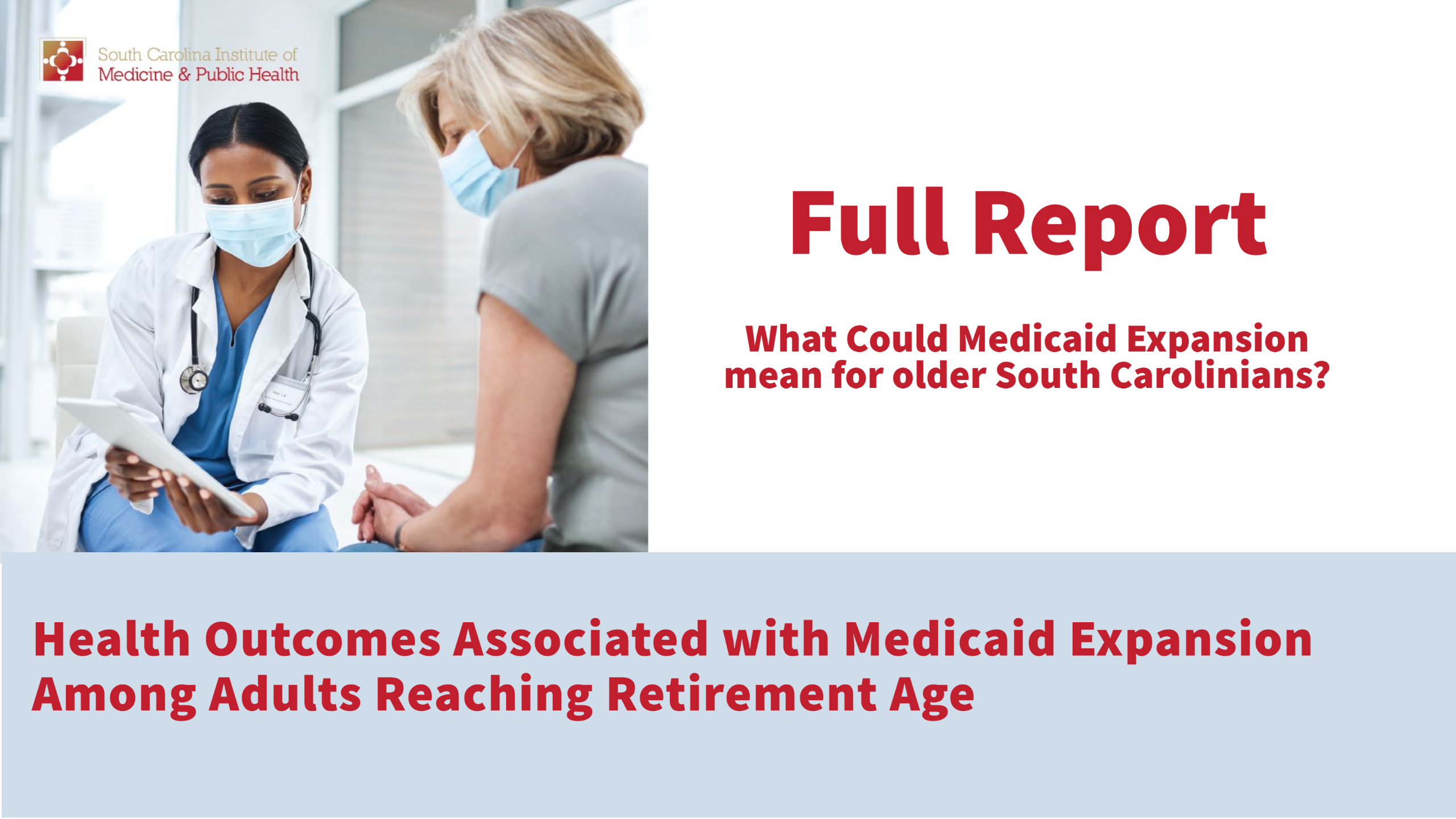AARP Hearing Center

SC IMPH MEDICAID EXPANSION REPORT 2021
SC IMPH MEDICAID EXPANSION SUMMARY 2021
With the passage of the Affordable Care Act, Congress enacted incentives for states to bring more lower-income people into the health care safety net by expanding services under Medicaid. In South Carolina, a debate about this issue started then – more than a decade ago, in 2010 – and continues today.
Arguments and advocacy regarding Medicaid expansion have covered an array of factors including economics, politics, disease prevalence and health disparities. But as other states have adopted Medicaid expansion, research is emerging to demonstrate its tangible effects in what surely is the most crucial area: the health of a state’s people.
A key segment: Adults approaching retirement
This report, “Health Outcomes Associated With Medicaid Expansion in Adults Reaching Retirement Age,” focuses on the implications for South Carolinians aged 50 to 64. It is a growing segment that makes up almost 20 percent of the state’s population. The report’s conclusions are clear:
- Research suggests that expanding Medicaid to low-income residents in this age group will greatly reduce deaths from chronic conditions that plague the state, including heart disease, diabetes and behavioral health disorders.
- Expanding vital preventive health services to these residents now is likely to reduce the later burden of Medicare spending, as they will approach their retirement years in better health.
About Medicaid expansion
The Affordable Care Act allowed for expansion of Medicaid to Americans under age 65 whose family income is at or below 133 percent of the federal poverty level. (Other incentives have been added since 2010.) Many lower-income South Carolinians ages 50 to 64 do not qualify for Medicaid – and also don’t qualify for health insurance subsidies through the Healthcare Marketplace.
Grim statistics
Drawing on a multitude of sources, the report sketches the impact of chronic diseases in South Carolina … services delayed, bills unpaid, people disabled, lives lost. Examples:
- Significantly higher than the U.S. average of diabetes prevalence, which increases as income decreases.
- A ranking of 43 of the 50 states in heart disease, the state’s leading cause of death.
- Higher than average rates of new cancer cases among adults 50 to 64. Also, lower rates of screening for lower-income residents, which are linked to worse outcomes.
- Elevated risk factors for Alzheimer’s disease and behavioral health conditions, both of which have been improved in states that expanded Medicaid.
What’s happened in other states
Well worth a close look is the report’s analysis of research on states that did expand Medicaid. Each has at least some similarities to South Carolina.
- Louisiana reported a significant increase in early-stage breast cancer diagnoses, improving changes for survival. Seventy percent of those impacted were aged 50 to 64.
- West Virginia estimated more than 300 residents between 55 and 64 were saved from premature death as a result of Medicaid expansion, and hospitals saved some $51 million in costs for care that would have been uncompensated.
- Montana reported improved access to health services, with particular benefits for the many residents in rural areas. Also, about 5,000 new jobs were created due to expansion.
- Kentucky saw a significant increase in residents who have primary care doctors and a significant decrease in emergency department visits. Job growth was boosted with a 7.1 percent increase in health care and social service jobs.
Implications for SC
With modest state investment eclipsed by the influx of federal funds, Medicaid expansion could have important health impacts, especially for this segment of older South Carolinians. Nearly a third of them spend at least 10 percent of their income on health services. More of them could stay healthier longer – and enter the Medicare system with less costly needs – should the state choose to expand Medicaid services, this report concludes.
Earlier this year AARP South Carolina conducted a survey of older adults on their feelings about Medicaid expansion. The survey found overwhelming bipartisan support for expanding Mediciad in South Carolina. The survey results can be found below.
South Carolina Voters' View on Medicaid Expansion
About the report author
Brittney Sanderson is a research and policy analyst with the South Carolina Institute of Medicine and Public Health. The institute is a nonpartisan, nonprofit organization that approaches health issues through data analysis and collaboration with various public and private entities. (For more, visit www.imph.org.)































































